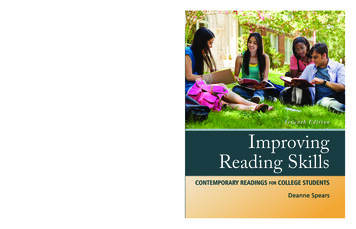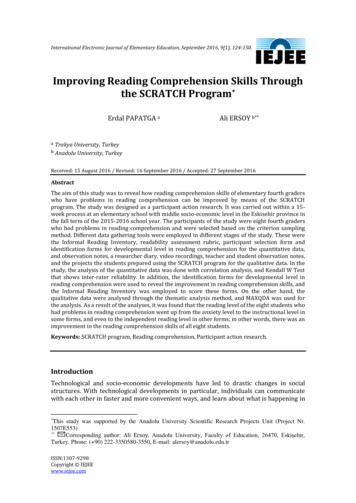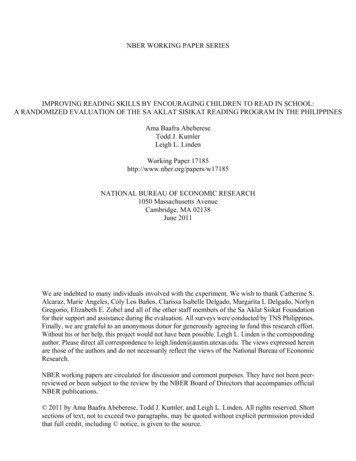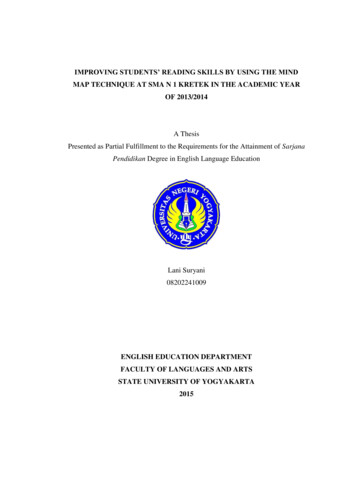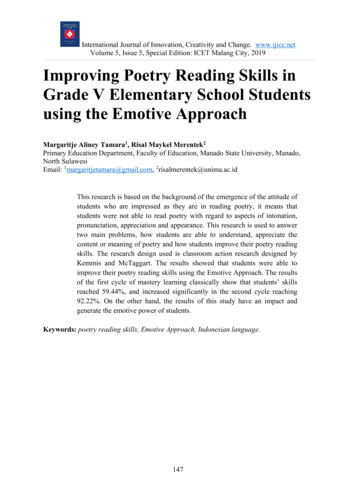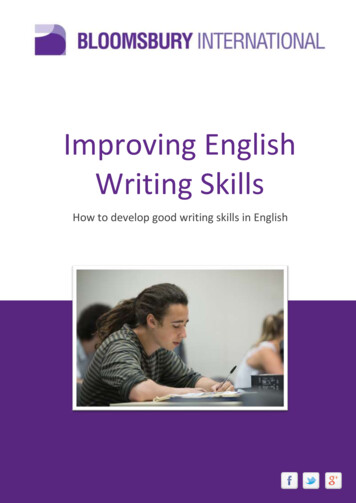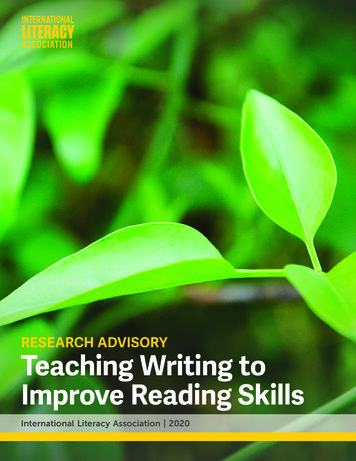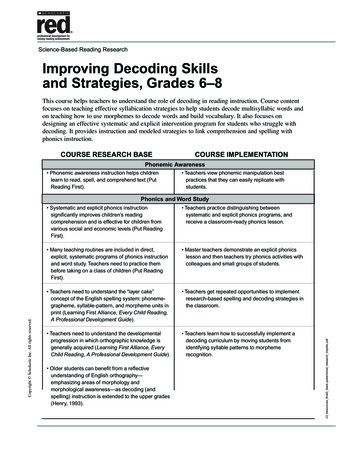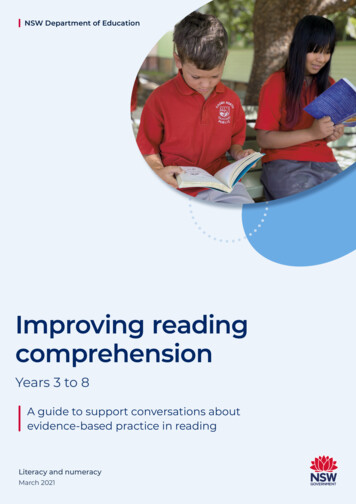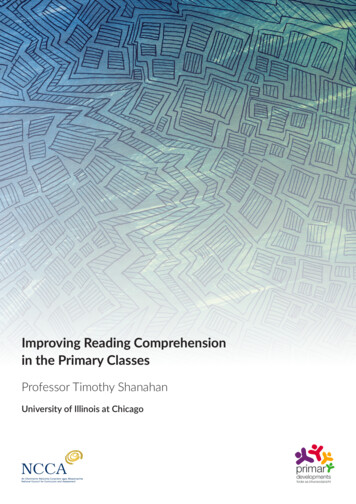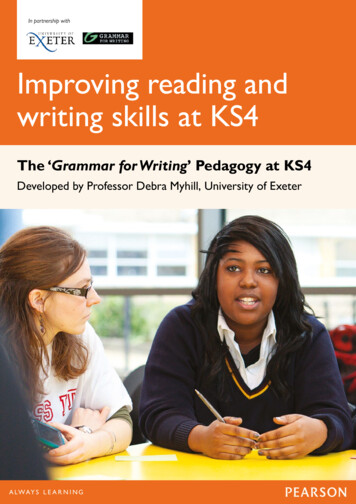
Transcription
In partnership withImproving reading andwriting skills at KS4The ‘Grammar for Writing’ Pedagogy at KS4Developed by Professor Debra Myhill, University of Exeter
Introduction:The Grammar for Writing pedagogyProfessor Debra Myhill directs an educational research teamat the University of Exeter. As well as being Associate Dean ofResearch, Debra also leads on the Secondary English PGCE courseat the University of Exeter and is a former English teacher.Debra and her team carry out research into a wide range ofareas within literacy, including focusing specifically on the role ofgrammar teaching in improving writing.In 2012 Professor Myhill published the findings of a three-yearstudy into the effectiveness of contextualised grammar teaching –a pedagogy developed at the University of Exeter and now calledGrammar for Writing.The Grammar for Writing pedagogy has since proven to almostdouble the rate of writing progress at KS3 in randomisedcontrol trials.Find out more about this initial KS3 study at:www.pearsonschools.co.uk/ks3gfwGrammar for Writing at KS4?GCSE change for 2015 brings about a new setof expectations and challenges for learners, mostnotably with the emphasis on 100% examination,literary heritage texts, writing skills and technicalaccuracy. Never before have reading and writingskills been so important for the success oflearners at school, college and in people’s learningand working lives.Naturally, the next step for the University ofExeter and Pearson was to discover whetherthe use of the Grammar for Writing pedagogy hadthe same profound results in boosting learnerprogress at KS4 as it did at KS3.2
The study Professor Myhill and her team set out to answer the question:‘Does explicit teaching of contextualised grammar at KS4improve pupils’ attainment in reading and writing non-fiction?’The KS4 study was designed to be as close to the initial large-scale study (KS3 version) as possible.lllThe trial involved 12 classes of year 10 studentsin 4 schools randomly selected from the SouthWest of England.The sample were randomly allocated intoeither an intervention group of 161 studentsor a comparison group of 147 students in aRandomised Control Trial (RCT) - the goldstandard in scientific research such as clinicaltrialling.The intervention group were taught a three weekscheme of work founded upon the principlesof the Grammar for Writing pedagogy, while thecomparison group were taught various schemes(according to the usual practice of their teachers)which focused on the same GCSE assessmentobjectives as the intervention.llAn abridged sample Edexcel GCSE Englishreading and writing non-fiction examinationpaper, marked by Edexcel examiners, was used tomeasure reading and writing attainment of bothgroups before and after the intervention period.Two students and the teacher from eachintervention class were interviewed twice duringthe delivery of the intervention, each timefollowing on from lesson observation.3
Summary of results– key findingsThe research findings showed very positive results from using Grammar for Writing with KS4-level students.lThe intervention had a statistically significant positive impact on student reading and writing outcomes,with a more significant impact on reading than on writing.lThe intervention had a statistically significant positive impact specifically on students’ responses toreading questions which required language analysis, and on the sentence structure, punctuation andspelling scores of the writing test.lIn the reading test, the benefits were greater for classes which had a higher ability profile, but the statisticaltests did not find that ability, gender, pupil premium status (or free school meal where schools used thatmeasure), or EAL status had a significant impact on the effect of the intervention.lEvidence from the student interviews and reading tests indicates that the use of metalinguisticterminology helped some students to articulate their thoughts more clearly when talking and writingabout texts, particularly when analysing language and discussing the effects of grammatical structures.lEvidence from the writing tests indicates that in the post-test intervention group, students were morefocused on crafting sentences for effect and were experimenting with a wider variety of sentencestructures.lParticipating teachers expressed the opinion that the scheme encouraged students to engage more‘consciously’ with the writing process, thinking more carefully about the options available to them andmore about the effect of the techniques applied, instead of writing a ‘stream of consciousness.’lExplicit attention to grammar can foster student reading and writing development when it iscontextualised within lessons which focus on reading and writing.You can read the full report at www.edexcel.com/gfw4
Pearsonand Grammar for WritingIn partnership withWe believe the Grammar for Writing pedagogy provides an exciting, evidence-based method for improvingwriting and reading progress at KS3 and KS4 through contextualised grammar teaching, which will help manylearners to effectively develop the English skills required today and to reach their true potential.We’ve been working alongside the University of Exeter since 2012 to embed this pedagogy in teaching andlearning resources for KS3, culminating in our Skills for Writing series.More recently, we’ve been working with Debra Myhill and the University of Exeter to develop a range offree resources, published resources and Professional Development training – all embedding the Grammarfor Writing pedagogy - for the new Edexcel GCSE 2015 qualifications.EdexcelGCSE 2015 (9-1) free supportAs part of our GCSE 2015 (9-1) qualifications offering, we’ll be providing a range of free support forour Edexcel centres which enables you to put the Grammar for Writing pedagogy into practice:l1 scheme of work: Truth is Stranger than Fictionl9 lessons, comprising lesson PowerPoints, worksheets, a lesson plan and various extra assetslA free lesson, available to download now at our webpage below.Find out more:www.edexcel.com/gfw5
Published resourcesIn spring 2015, we’ll be launching a brand new teaching and learning service designedspecifically for the new Edexcel GCSE (9-1) English Language specification.The coursecomponents incorporate both the Grammar for Writing and the Let’s Think in Englishpedagogies, to help you improve learner outcomes for all of your students.The resources follow on from the successful Skills for WritingKS3 series, designed to fully prepare learners of all ability forthe challenges of the new GCSE 2015 curriculum.The resources will comprise:ll*ActiveLearn Digital Service, powered byActiveTeach, giving you full access to ourinteractive front-of-class teaching, planning andassessment service: a wealth of resources tosupport every extract in the Text Anthology.Professional Development Pedagogy Trainingdelivered by experts to provide a deepunderstanding of the pedagogies and how best toembed them into your teaching.l*Text Anthology (printed) -100 fiction and nonfiction extracts carefully chosen to engage children.l*Revision Guide and Workbook to supportmock and final exam preparation.*These published resources are not yet endorsed and will be subject to changeFind out more: www.pearsonschools.co.uk/edgcseenglangcg6
Principlesof the Grammar for Writing pedagogyThe Grammar for Writing pedagogy has been developed and refined through a lengthy andrigorous process of trialling and the use of quantitative and qualitative feedback from thattrialling. Over that time, seven key principles have emerged:1. Make a link between the grammar beingintroduced and how it works in the writingbeing taught.The emphasis throughout the Grammar forWriting pedagogy is on exploring the effectsthat grammatical features create on thereader.This might be exploring the use ofmodal verbs by speech writers to expressdifferent levels of assertiveness, or the way afiction writer uses extended noun phrases toadd descriptive detail.2. Explain the grammar through examples, notlengthy explanations.Grammar for Writing is not a grammar course.The purpose is not to produce students whocan identify and label parts of a sentence; ratherthe purpose is to make visible how texts areshaped and how effects are created, so thatstudents can apply this understanding to theirown writing.3. Build in high-quality discussion aboutgrammar and its effects.At the heart of Grammar for Writing is theprinciple that talk is a key mechanismthrough which students learn.The approachdeliberately incorporates regular opportunitiesfor students to discuss the grammar pointsbeing introduced, to explore the possibilities oflanguage and discuss interpretations and effects.Find out more:www.edexcel.com/gfw4. Use authentic examples from authentictexts to link writers to the broadercommunity of writers.Using authentic texts avoids the pitfalls ofexamples artificially created to exemplify agrammatical point, and also helps young writersexplore what real writers do, what choices theymake in order to create desired effects.5. Use ‘creative imitation’ to offer modelpatterns for students to play with and thenuse in their own writing.Imitation can be a powerful tool with whichto improve students’ writing.The Grammar forWriting approach advocates the use of textualmodels and the use of imitation as a scaffoldthat allows students to try out new structuresand play with new ways of expressingsomething.6. Select activities which support students inmaking choices and being designers of writing.Grammar for Writing seeks to show studentshow design choices operate at every levelof text production, from choices about thecontent and structure of a text to the choicesabout words, images and syntactical structures.7. Include language play, experimentation,risk-taking and games.Where ‘traditional’ grammar teaching has oftenbeen characterised by prescriptive, rule-boundviews and an emphasis on accuracy and errorcorrection, Grammar for Writing promotesplayfulness and experimentation with language.This helps young writers to see the elasticity oflanguage and the possibilities it affords, ratherthan what writers must not do.7
S14ENG02260C02U054awww.edexcel.com/gfwPearson Ltd is committedto reducing its impact onthe environment by usingresponsibly sourced andrecycled paper.8Whethis
Pearson and Grammar or Wf tinri g We believe the Grammar or Wf riting pedagogy provides an exciting, evidence-based method for improving writing and reading progress at KS3 and KS4 through contextualised grammar teaching, which will help many learners to effectively develop the English skills
